Related Research Articles

Isidore of Seville was a Hispano-Roman scholar, theologian, and archbishop of Seville. He is widely regarded, in the words of 19th-century historian Montalembert, as "the last scholar of the ancient world".
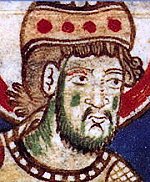
Pope Damasus I, known as Damasus of Rome, was the bishop of Rome from October 366 to his death. He presided over the Council of Rome of 382 that determined the canon or official list of sacred scripture. He spoke out against major heresies, thus solidifying the faith of the Catholic Church, and encouraged production of the Vulgate Bible with his support for Jerome. He helped reconcile the relations between the Church of Rome and the Church of Antioch, and encouraged the veneration of martyrs.

Hilary of Poitiers was Bishop of Poitiers and a Doctor of the Church. He was sometimes referred to as the "Hammer of the Arians" and the "Athanasius of the West". His name comes from the Latin word for happy or cheerful. In addition to his important work as bishop, Hilary was married and the father of Abra of Poitiers, a nun and saint who became known for her charity.
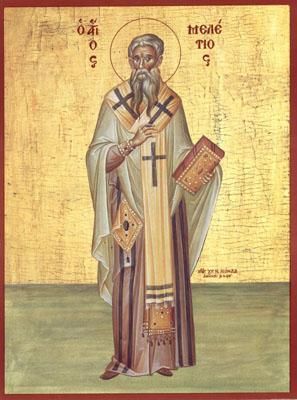
Saint Meletius was a Christian bishop of Antioch from 360 until his death in 381. However, his episcopate was dominated by a schism, usually called the Meletian schism.
Maximus, also known as Maximus I or Maximus the Cynic, was the intrusive archbishop of Constantinople in 380, where he became a rival of Gregory Nazianzus.
Gennadius of Massilia, also known as Gennadius Scholasticus or Gennadius Massiliensis, was a 5th-century Christian priest, monk, and historian.

Eusebius of Vercelli was a bishop from Sardinia and is counted a saint. Along with Athanasius, he affirmed the divinity of Jesus against Arianism.
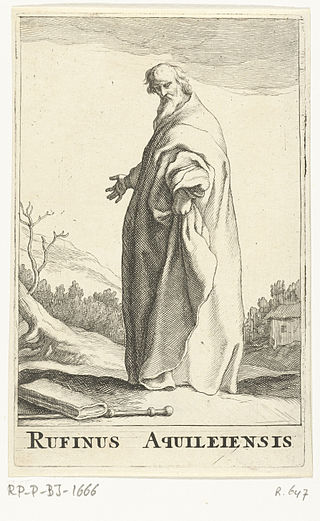
Tyrannius Rufinus, also called Rufinus of Aquileia, was a monk, philosopher, historian, and theologian who worked to translate Greek patristic material, especially the work of Origen, into Latin.
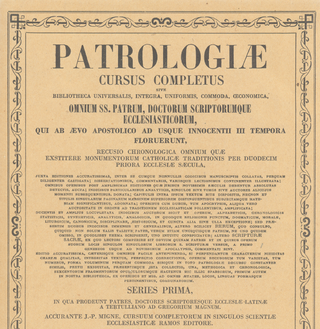
The Patrologia Latina is an enormous collection of the writings of the Church Fathers and other ecclesiastical writers published by Jacques-Paul Migne between 1841 and 1855, with indices published between 1862 and 1865. It is also known as the Latin series as it formed one half of Migne's Patrologiae Cursus Completus, the other part being the Patrologia Graeca of patristic and medieval Greek works with their medieval Latin translations.

Lucifer of Cagliari was a bishop of Cagliari in Sardinia known for his passionate opposition to Arianism. He is sometimes venerated as a Saint in Sardinia, though his status remains controversial.

Braulio, 585 – 651 CE, was bishop of Zaragoza and a learned cleric living in the Kingdom of the Visigoths. Both as pastor and writer, he is one of the most celebrated of saints of the Visigothic Kingdom of Hispania that lasted from the 5th to the 8th century.

Ildefonsus or Ildephonsus was a scholar and theologian who served as the metropolitan Bishop of Toledo for the last decade of his life. His Gothic name was Hildefuns. In the Ethiopian Orthodox Tewahedo Church he is known as Dexius based on the Ge'ez translation of legends about his life.
Faustinus was bishop of Brescia from c. 360, succeeding Ursicinus. His feast day in the Roman Catholic Church is 15 February: 16 February in the Orthodox Church.

Faustus of Riez was an early Bishop of Riez (Rhegium) in Southern Gaul (Provence), the best known and most distinguished defender of so-called Semipelagianism.
Audentius was bishop of Toledo (Hispania), according to tradition in the years 385-395 AD. In the Catholic Encyclopedia (1912), the Count of Cedillo places his episcopate around the year 376. In the 17th century, William Cave supposed him to have lived about 260 AD.
Orsisius was an Egyptian monk and author of the fourth century. His memorial is June 15.

De Viris Illustribus is a collection of short biographies of 135 authors, written in Latin, by the 4th-century Latin Church Father Jerome. He completed this work at Bethlehem in 392–393 AD. The work consists of a prologue plus 135 chapters, each consisting of a brief biography. Jerome himself is the subject of the final chapter. A Greek version of the book, possibly by the same Sophronius who is the subject of Chapter 134, also survives. Many biographies take as their subject figures important in Christian Church history and pay especial attention to their careers as writers. It "was written as an apologetic work to prove that the Church had produced learned men." The book was dedicated to Flavius Lucius Dexter, who served as high chamberlain to Theodosius I and as praetorian prefect to Honorius. Dexter was the son of Saint Pacianus, who is eulogized in the work.
Maximus was the first Visigothic bishop of Zaragoza (Hispania) in 592–619. He was also a theologian and historian.
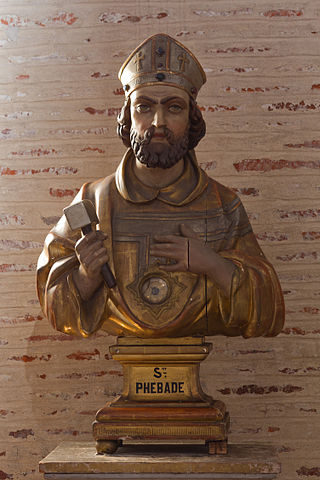
Phoebadius of Agen was a Catholic bishop of the fourth century. At the Council of Ariminum in 359 and other councils, he was a supporter of Nicaean orthodoxy. He wrote several works, including a treatise against the Arians which still survives.
Potamius, also known as Potamius of Lisbon, was the first recorded bishop of the city of Lisbon. He was possibly born in Lisbon, given that Iberian communities at the time usually chose their own citizens as bishops. He was part of the Council of Sirmium in 357, in which he defended Arianism. He is the second earliest Christian prose writer of the Iberian Peninsula, with Hosius of Corduba being the first.
References
- Francesco Florio , De Sancto Gregorio Illiberitano, libelli de Fide auctore (Bologna, 1789)
- Germain Morin, Les Nouveaus Tractatus Origenis et l'heritage litteraire de l'eveque espagnol, Gregoire d'Illiberis in Revue d'historie et de literature relig. (1900, V, 145 sq.)
- Otto Bardenhewer, Patrologie, tr. Shahan (St. Louis, 1908), 415
- Gams, Kirchengeschichte vom Spanien (Ratisborn, 1864), II, 256 sq.
- Gustav Krüger, Lucifer, Bischof von Calaris, und das Schisma der Luciferianer (Leipzig, 1886), 76 sq.
- Henri Leclercq, L'Espagne chrétienne (Parish, 1906), 130 sq.